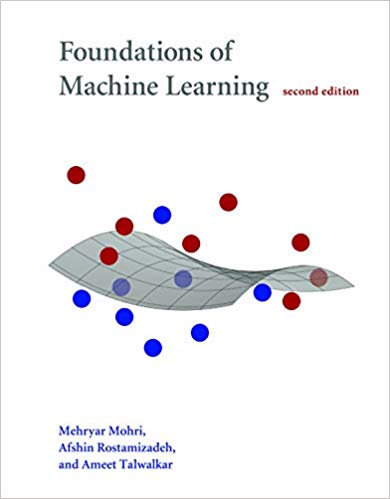
|
FreeComputerBooks.com
Links to Free Computer, Mathematics, Technical Books all over the World
|
|
- Title: Foundations of Machine Learning
- Author(s) Mehryar Mohri, Afshin Rostamizadeh, Ameet Talwalkar
- Publisher: The MIT Press; 2nd edition; eBook (MIT Open Acess Edition, Creative Commons Licensed)
- License(s): Creative Commons License (CC)
- Hardcover: 504 pages
- eBook: HTML and PDF (505 pages)
- Language: English
- ISBN-10: 0262039400
- ISBN-13: 978-0262039406
- Share This:

|
This book is a general introduction to machine learning that can serve as a textbook for graduate students and a reference for researchers. It covers fundamental modern topics in machine learning while providing the theoretical basis and conceptual tools needed for the discussion and justification of algorithms. It also describes several key aspects of the application of these algorithms. The authors aim to present novel theoretical tools and concepts while giving concise proofs even for relatively advanced topics.
It is unique in its focus on the analysis and theory of algorithms.
About the Authors- N/A
- Machine Learning
- Neural Networks and Deep Learning
- Artificial Intelligence
- Data Analysis and Data Mining

- Foundations of Machine Learning (Mehryar Mohri, et al)
- The Mirror Site (1) - PDF
- The Mirror Site (2) - PDF
-
 Learning Theory from First Principles (Francis Bach)
Learning Theory from First Principles (Francis Bach)
A comprehensive and cutting-edge introduction to the foundations and modern applications of learning theory. To acquire a basic mathematical understanding of the most widely used machine learning architectures.
-
 The Hundred-Page Machine Learning Book (Andriy Burkov)
The Hundred-Page Machine Learning Book (Andriy Burkov)
Everything you really need to know in Machine Learning in a hundred pages! This book provides a great practical guide to get started and execute on ML within a few days without necessarily knowing much about ML apriori.
-
 Practical Machine Learning: A Beginner's Guide with Ethical Insights
Practical Machine Learning: A Beginner's Guide with Ethical Insights
The book provides an accessible, comprehensive introduction for beginners to machine learning, equipping them with the fundamental skills and techniques essential for this field.
-
 Dive into Deep Learning (Aston Zhang, et al.)
Dive into Deep Learning (Aston Zhang, et al.)
This is an open source, interactive book provided in a unique form factor that integrates text, mathematics and code, now supports the TensorFlow, PyTorch, and Apache MXNet programming frameworks, drafted entirely through Jupyter notebooks.
-
 Understanding Machine Learning: From Theory to Algorithms
Understanding Machine Learning: From Theory to Algorithms
Explains the principles behind the automated learning approach and the considerations underlying its usage. Provides an extensive theoretical account of the fundamental ideas underlying machine learning and the mathematical derivations.
-
 Machine Learning Yearning (Andrew Ng)
Machine Learning Yearning (Andrew Ng)
You will learn how to align on ML strategies in a team setting, as well as how to set up development (dev) sets and test sets. After finishing this book, you will have a deep understanding of how to set technical direction for a machine learning project.
-
 Reinforcement Learning: An Introduction, Second Edition
Reinforcement Learning: An Introduction, Second Edition
It provides a clear and simple account of the key ideas and algorithms of reinforcement learning that is accessible to readers in all the related disciplines. Focuses on core online learning algorithms, with the more mathematical material set off in shaded boxes.
-
 Probabilistic Machine Learning: An Introduction (Kevin Murphy)
Probabilistic Machine Learning: An Introduction (Kevin Murphy)
This book is a comprehensive introduction to machine learning that uses probabilistic models and inference as a unifying approach. It is written in an informal, accessible style, complete with pseudo-code for the most important algorithms.





